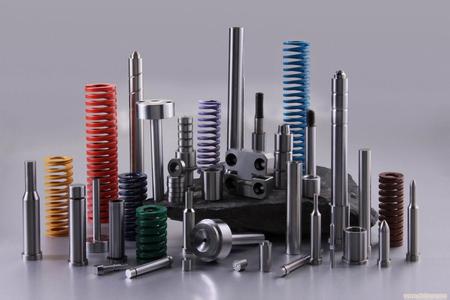 In recent years, the pace of structural adjustment in China's mold industry has accelerated, mainly manifested in the development speed of large-scale, sophisticated, complex, long-life molds and mold standard parts that exceed the overall development speed of the industry; the proportion of plastic molds and die-casting molds has increased; the market-oriented specialty The number and capacity of mold manufacturers have increased rapidly. With the continuous deepening of the reform of the economic system, the development of "funded enterprises" and private enterprises is very fast. According to the statistics of the National Bureau of Statistics, by the end of 2006, there were 1,314 above-scale enterprises in China's mold manufacturing industry, with 244,155 employees. The annual industrial output value was 55.561 billion bald. Achieve sales revenue and profits of 53.958 billion yuan and 4.675 billion yuan; export 1 billion US dollars. Imports 1.47 billion U.S. dollars.
In recent years, the pace of structural adjustment in China's mold industry has accelerated, mainly manifested in the development speed of large-scale, sophisticated, complex, long-life molds and mold standard parts that exceed the overall development speed of the industry; the proportion of plastic molds and die-casting molds has increased; the market-oriented specialty The number and capacity of mold manufacturers have increased rapidly. With the continuous deepening of the reform of the economic system, the development of "funded enterprises" and private enterprises is very fast. According to the statistics of the National Bureau of Statistics, by the end of 2006, there were 1,314 above-scale enterprises in China's mold manufacturing industry, with 244,155 employees. The annual industrial output value was 55.561 billion bald. Achieve sales revenue and profits of 53.958 billion yuan and 4.675 billion yuan; export 1 billion US dollars. Imports 1.47 billion U.S. dollars. The mold industry is increasingly developing and molds are becoming larger. This is due to the high production efficiency requirements. The "one-mode multicavity" technology developed to increase production efficiency is waiting for more and more extensive applications. Obviously, the same injection molding process can produce multiple products at the same time, and the production efficiency is naturally doubled. Another reason is that parts have also become larger, and this has led directly to the need for larger molds.
How to get rid of large-scale mold problems With the increasing size of molds and components, we are bothered by how to meet the increasing surface precision requirements of large-scale molds and components, and how to extend the service life of these large-scale molds and components, while at the same time But also take into account the comprehensive requirements of wear, corrosion, high hardness and so on?
To successfully break through this bottleneck, we must break through the challenges of human resources, technology and capital. Companies need to invest in sophisticated new CNC equipment. However, these equipments frequently require a million yuan investment, and the investment recovery period is generally more than five years. The mold industry is mostly one-piece operations and the processes are complex. Therefore, the scale of the enterprises is generally relatively small, and subsequent capital investment is relatively difficult. According to a person from the Ningbo Shuanglin Group, taking a machine tooling investment of 1 million yuan as an example, in the first five years, 90% was the cost, and only 10% of the revenue would be generated after 5 years. However, due to the large wear of processing equipment, the general mold companies are reluctant to invest, which also hinders the technological progress of the company.
Talent is also a major bottleneck for the mold industry. At present, most of the mold industry adopts numerical control technology, which requires high quality of the operators. In addition, the talent training in the mold industry generally requires more than 5 years of experience. However, many students who graduated from colleges and universities now lack patience and make the mold industry talents. The total amount is less.
The mold industry has begun to develop in the direction of large-scale, high-precision, multi-functional composites, etc. The application of mold standard parts will become more and more extensive, the proportion of plastic molds will continue to increase, and the technical content of molds will need to be improved.
Thermoplastic Polyurethane (TPU) is a type of polymer resin that is known for its flexibility, durability, and versatility. It is a thermoplastic material, which means it can be melted and reprocessed multiple times without losing its original properties.
TPU is commonly used in various industries, including automotive, electronics, footwear, and sportswear. It is often used to make products such as phone cases, cables, hoses, seals, gaskets, and inflatable structures.
Some key properties of TPU include:
1. Flexibility: TPU has excellent flexibility, allowing it to bend and stretch without breaking. This makes it suitable for applications where flexibility is required, such as in shoe soles or flexible electronic components.
2. Abrasion resistance: TPU has good resistance to abrasion, making it suitable for applications that require durability and resistance to wear and tear.
3. Chemical resistance: TPU is resistant to many chemicals, including oils, solvents, and greases. This makes it suitable for applications where exposure to chemicals is expected.
4. Weather resistance: TPU has good weather resistance, meaning it can withstand exposure to sunlight, moisture, and extreme temperatures without degrading or losing its properties.
5. Adhesion: TPU has good adhesion to various substrates, allowing it to be easily bonded or laminated with other materials.
Overall, TPU is a versatile material that offers a balance of flexibility, durability, and chemical resistance, making it suitable for a wide range of applications.
Tpu For Tube And Hose,Food Grade Tpu Tube,Flexible Stpu Tube And Hose,Fda Grade Tpu Material
XUCHUAN CHEMICAL(SUZHOU) CO., LTD , https://www.xuchuanpu.com